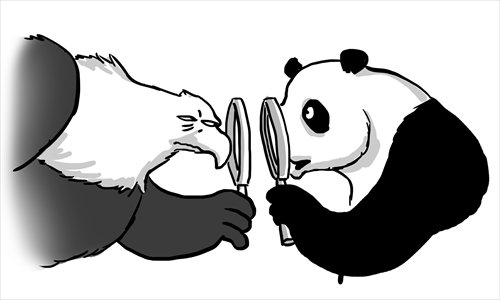 86-year glorious history of Chinese PLA
86-year glorious history of Chinese PLA
 Damages caused by rainstorm in NW China
Damages caused by rainstorm in NW China
 Ancient city Luoyang of Sui and Tang Dynasties
Ancient city Luoyang of Sui and Tang Dynasties
 DPRK top leader mourns fallen Chinese fighters in Korean War
DPRK top leader mourns fallen Chinese fighters in Korean War
 Southern China wilts under heat wave
Southern China wilts under heat wave
 Beautiful sunrise in Taiwan
Beautiful sunrise in Taiwan
 Syrian army regains strategic district in Homs province
Syrian army regains strategic district in Homs province
 Xiaomi shifts into low end of mobile sector
Xiaomi shifts into low end of mobile sector
 Sun Yang wins gold medal of men's 800m freestyle
Sun Yang wins gold medal of men's 800m freestyle
 |
| Illustration: Liu Rui/GT |
Misunderstanding and misperception are hallmarks of international relations; indeed, they are central to the functioning of great power politics. The recent op-ed by Robert Manning and the response from Jin Canrong, published in the Global Times, serve as cases in point.
Manning sees US efforts to shore up relationships in the Asia-Pacific region as part of a long-term effort to redistribute resources away from the model established in the Cold War, while Jin believes "if the US aims to be a responsible world power, it should persuade those small countries not to stir up tensions."
The conflict between these positions is in some ways more, and in some ways less real than it seems.
The growth of the military and economic power of China inevitably reduces the military freedom-of-action of the US. No claims about "a peaceful rise" or about "building a partnership" can prevent this shift from causing tensions between Washington, Beijing, and the host of smaller capitals caught between.
This basic reality generates misperception. Security politics in the Cold War involved a series of fundamental misunderstandings about the nature of the NATO-Warsaw Pact relationship.
NATO, sensibly, saw the massive Soviet Red Army as a threat capable of tearing through Germany and to the English Channel.
The Soviets, remembering when a much smaller Wehrmacht surprised and nearly destroyed the Red Army in 1941, viewed their many divisions - not to mention the larger occupation of Eastern Europe - as measures of security and defense.
Put bluntly, there is no set of policies that the US could undertake that would relieve China of its concerns about containment. Barring complete disarmament, there is no set of policies that China could pursue that would relieve the US of concerns about growing Chinese influence in Asia.
Indeed, given the panic that Japan's economic rise of the 1970s and the 1980s induced in the US, even disarmament would be unlikely to do the trick.
All that said, Beijing and Washington can manage the tensions over "containment" for better or worse.
First and foremost, policymakers must understand the facts of misperception and asymmetric information.
Governments have a tendency to view the actions of their counterparts in the grimmest possible light, and to overstate their own importance in the calculations of others.
Not every US action in the Pacific is geared toward the containment of China, just as not every new destroyer launched by China threatens to destabilize the balance of power in the Pacific.
Policymakers can also rely on the daily grind of "low" international politics, including regular business, investment, tourism and educational exchange, to take the edge off the high political tensions.
China and the US have developed a deep, extensive, powerful transnational lobby for good relations with one another, simply by allowing the commerce of normal life to take place between Chinese and US citizens.
Such a lobby cannot always prevent conflict - a similar transnational community existed in Europe prior to World War I - but it can surely help provide context for national decision-making.
But simply understanding the negative effects of misperception and misunderstanding cannot make those effects go away.
Beijing and Washington can take steps to reduce tensions over specific issues. In the end, however, "assuring" Washington of Beijing's peaceful intentions, or "making space" for China's rise in the Western Pacific are effectively impossible.
The US may or may not be pursuing a strategy of containment; it's unclear that the foreign policymaking process in Washington is coherent enough to be called a "strategy."
But almost anything that the US does will be perceived in China as part of a grander project of containment, while Americans will see nearly every effort by China to improve its position as a threat.
Many of the most important aspects of the US-China relationship are positive sum; both sides can gain from it. But zero-sum, conflictual aspects cannot be escaped, and will continue to color perceptions on both sides of the Pacific.
 APF officers and men in actual-combat drill
APF officers and men in actual-combat drill 192nd Anniv. of Peru's Independence
192nd Anniv. of Peru's Independence Man commits suicide, rescued by his wife
Man commits suicide, rescued by his wife Luoyang 5A Longtan Canyon Scenery Area
Luoyang 5A Longtan Canyon Scenery Area Two gold-backed ETFs launched in Shanghai
Two gold-backed ETFs launched in Shanghai Barcelona World Championships
Barcelona World Championships Day|Week|Month